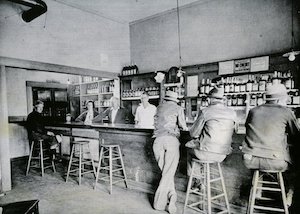
Interior of Dick’s Place, 1937. Behind the bar [left to right]: Irene Cecchi, Dora Cecchi, Dick Cecchi, and Herman Figaro.
May 17, 1894 – Riccardo “Dick” Cecchi was born in Fornovolasco, Italy. When he was 10 years old, he immigrated with his father to California, and in 1908, Riccardo, now known as Dick, moved to Elk to live with his uncle, Ottavio Viviani.
Dick spent the next 20 years working in logging camps in the Mendocino area. He met his future wife Dora at the Irmulco camp, and they married three months later on March 28, 1921. Dick and Dora had 3 children: Lena, Pete, and Irene.
As the logging business began to dwindle with the depression, Dick and Dora opened a liquor store on Mendocino’s Main Street on October 15, 1934. Two years later, they got an on-sale liquor license and began the bar. In 1937, they purchased the bar building and the house next door. The family moved in and began work on starting an Italian cafe.
The cafe “opened in 1938, the same year the Union Lumber Company closed the Mendocino Mill. At the time about 450 WPA workers were brought into the area and camped outside the town at the Woodlands Fire Station on Little Lake Road. A walk down to Dick’s with a dime in your pocket would net a shot of whiskey. The most expensive drink was a quarter.” (Mendocino Beacon, October 20, 1983)
Dick’s Place was a family-run business. Dick, and later Pete, worked behind the bar, while Dora cooked food, Lena washed dishes, and Irene waited tables.
In 1961, Dick suffered a stroke and had to quit working. The family stopped serving food, but the bar continued under Pete’s management. Dick passed away at a Fort Bragg hospital in 1967. The Rev. Fr. Alphonsus O’Connor officiated at his funeral, and Dick was buried in the Cecchi family plot in Hillcrest Cemetery. Pallbearers were Reginald Gomes, Delbert Schlafer, Raymond Sandbothe, Alvin Mendosa, Kenneth Shrode, and David Giusti.
How Mendocino Evolved by Chuck Bush – A Kelley House Museum publication covering the history of Mendocino and coastal growth during the logging years. $15.